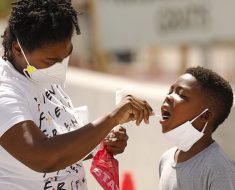Birth order may play a significant role in how children learn about sex, especially for boys, according to a new study published in the journal Sex Education.
Researchers found that first-born children were more likely to report parental involvement in sex education than later-born children, a pattern which was especially pronounced in men.
Led by the London School of Hygiene & Tropical Medicine (LSHTM), the study is the first to look at the relationship between birth order and two key sexual health outcomes: parental involvement in sex education and early sexual experience.
The study’s authors say that a better understanding of the relationship between birth order and parental involvement in learning about sex could help to improve the design and delivery of sex education programmes.
Researchers used data from the third National Survey of Sexual Attitudes and Lifestyles (Natsal-3), the largest scientific studies of sexual health and lifestyles in Britain. Conducted by LSHTM, UCL and NatCen Social Research, the studies have been carried out every 10 years since 1990, and have involved interviews with more than 45,000 people to date.
Taking a sub-sample of Natsal-3 participants — 5,000 individuals aged 17 to 29 who were either first-born, middle-born or last-born — the team analysed responses to questions about the involvement of parents or siblings in sex education and early sexual experiences .
First-born children were more likely to report parental involvement in sex education compared with later-born children. From the study sample, 48% of first-born women and 37% of first-born men reported discussing sex with a parent aged 14, as opposed to 40% of middle-born women and 29% of middle-born men.
Middle-born and last-born men were less likely than first-born to report having found it easy to discuss sex with their parents growing up. Later-born men were also less likely to report learning about sex from their mothers, while last-born women were less likely than first-born women to report a parent as a main source of sex education.
Although there were differences by birth order in parental involvement in sex education, there did not appear to be an association between birth order and early sexual experiences, although middle-born men were at increased odds of being under 16 when they first had sex.
Dr Lotte Elton, who led the research as part of her MSc project at LSHTM, said: “Although there has been much research into how the order in which children are born into a family may impact psychological or social outcomes, studies on the relationship between birth order and sexual health outcomes are limited.
“In addition to seeing differences in sex education according to birth order, we also found clear differences between the sexes; across all birth order categories, men consistently reported lower parental involvement in sex education than women. Our findings suggest that the previously-reported difficulties men face in talking about sex with parents may be exacerbated if they are middle- or last-born.”
When researchers looked at sibling involvement in learning about sex, they found that all later-born children were more likely to report learning about sex from siblings compared with first-born children.
Although there is little research on how sex education from siblings might affect sexual health, associations between sibling behavior and sexual health outcomes have been documented — for example, having a sexually active brother or sister has been linked with more liberal sexual attitudes, and sisters of pregnant and childbearing adolescents have been found to be younger at first sexual intercourse.
With later-born children reporting that siblings played a greater role in their learning about sex, the authors say that brothers and sisters could be utilized in sex education programmes.
Given that later-born children are learning from their siblings about sex, dedicated sex education programmes could better equip adolescents to teach their younger siblings about sex, particularly where parental involvement in sex education is low.
Wendy Macdowall, senior investigator from LSHTM, said: “Our findings support previous work demonstrating gender disparities in family involvement in sex education, highlighting the need for further work in this area — particularly around how birth order might affect the involvement of parents in children’s sex education.
“The results are particularly significant given plans to make sex education compulsory in schools in England and Wales, since relying on parents to provide sex education for children may disadvantage later-borns.”
The authors acknowledge the limitations of the study. Of particular importance is that middle-born children had different socio-demographic characteristics, including social class and ethnicity, compared to first- and last-born children, which means that even with statistical adjustment, the results for middle-born children may reflect socio-demographic differences rather than birth order.
Furthermore, although adjustment was made for sibling number, other sibling factors which were not adjusted for, such as gender and age difference, which may have been relevant.
Natsal-3 is one of the largest and most comprehensive studies of sexual behaviour and lifestyles in the world, and is a major source of data informing sexual and reproductive health policy in Britain. Natsal was funded by the Medical Research Council and the Wellcome Trust, with additional funding from the UK Research and Innovation and Department of Health and Social Care.
Source: Read Full Article





